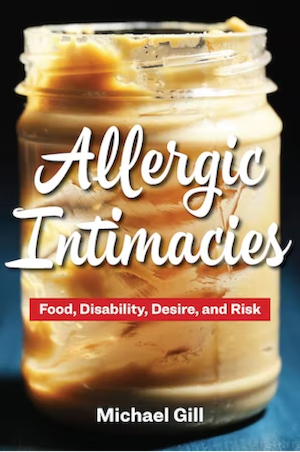Professor Michael Gill’s new book—Allergic Intimacies: Food, Disability, Desire, and Risk (Fordham Press, 2023)—is the first to explore food allergies in the United States from the perspective of disability and race. Central questions frame Gill’s analysis: Are food allergies disabilities? What structures and systems ensure the survival of some with food allergies and not others?
Allergic Intimacies is a groundbreaking critical engagement with food allergies in their cultural representations, advocacy, law, and stories about personal experiences from a disability studies perspective. Professor Gill questions the predominantly individualized medical approaches to food allergies, pointing out that these approaches are particularly problematic where allergy testing and treatments are expensive, inconsistent, and inaccessible for many people of color.
is a groundbreaking critical engagement with food allergies in their cultural representations, advocacy, law, and stories about personal experiences from a disability studies perspective. Professor Gill questions the predominantly individualized medical approaches to food allergies, pointing out that these approaches are particularly problematic where allergy testing and treatments are expensive, inconsistent, and inaccessible for many people of color.
Gill explores the multiple meanings of food allergies and eating in the United States, demonstrating how much more is at stake than we realize, at a critical time when food allergies are on the rise: An estimated 32 million Americans, including one in 13 children, have food allergies, and diagnoses of food allergies in children have increased by 50% since 1997.
Yet as Gill makes clear, the whiteness of the food allergy community and single-identity disability theory is inherently limiting and insufficient to address the complex choices that those with food allergies make. Gill argues that racism and ableism create unique precarity for disabled people of color that food allergic communities are only beginning to address.
As Gill discusses, there is a huge disparity in access to testing and treatment, with African American and Latinx children having higher risk of adverse outcomes than white children, including more rates of anaphylaxis. Food allergy professionals have a responsibility to move beyond individualized approaches to more robust coalitional efforts grounded in disability and racial justice to undo these patterns of exclusion.

Allergic Intimacies celebrates the various creative ways food allergic communities are challenging historical and current practice of exclusion, while identifying the depth of work that still needs to be done to shift focus from a white allergic experience toward a more representative understanding of the racial, ethnic, religious, and economic diversity of those in the United States. Gill’s book is a discerning and vital exploration of the key debates about risks, dangers, safety, representations, and political concerns affecting the lives of individuals with food allergies.
“Allergic Intimacies reminds us why we so urgently need this kind of analysis to better understand food-related allergies,” writes Professor Anita Mannur, Miami University. “In light of the current contemporary public health global pandemic, there is an even greater urgency to foreground how food studies and disability studies think, not just about Covid-19, but also about health issues that affect immune-compromised people.”
Adds Professor Alison Kafer, University of Texas at Austin, “Allergic Intimacies offers a queer crip analysis of food allergies, revealing their fundamentally relational and temporal dimensions. Blurring the boundaries between individuals, their immune systems, and their desires, Gill argues for interdependence and solidarity across allergies and dietary needs.”
Excerpt from Allergic Intimacies
… If I were cured of my allergy, I don’t know if I would ever enjoy (or even seek out) a meal with nuts. Once a food product becomes lethal or toxic, I expect it would be hard to reclaim that product as pleasurable or even desirable.
Can nuts ever become safe given their current status as risky? The taste and smell can certainly trigger a psychosomatic response, even if the individual is “safe.” When I smell roasted nuts, for example, I feel my throat tingle, but is the throat tingling because of aerosolized proteins, or because the smell reminds my body of previous reactions when I consumed nuts and required a trip to the emergency room?
In thinking about issues related to future and temporality, I don’t envision a future me as a nut eater. I do, however, imagine and desire a future where a politics of food expands conceptions of livability. Where communities and assemblages become intentional spaces fostering inclusivity, an inclusivity that is not tied to productivity, but rather acknowledges and appreciates multiplicities of beings, environments, identifications …
